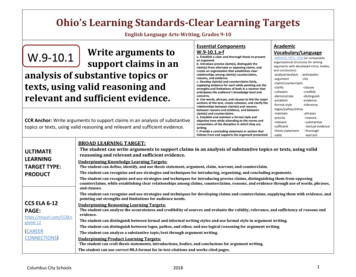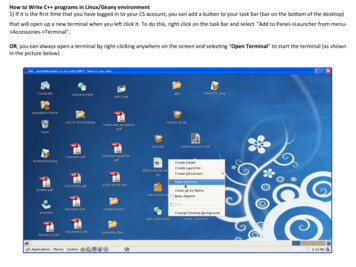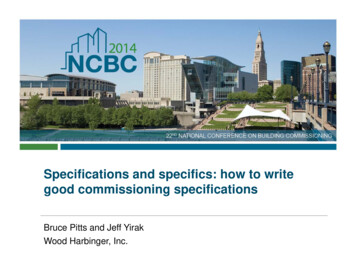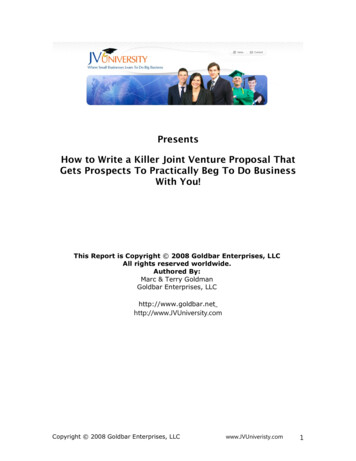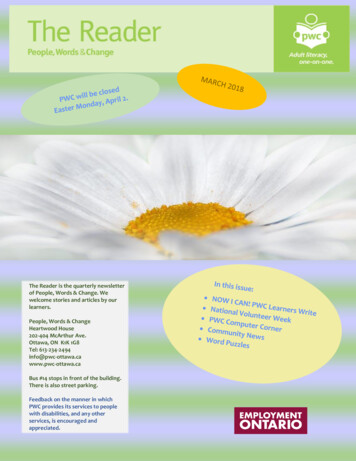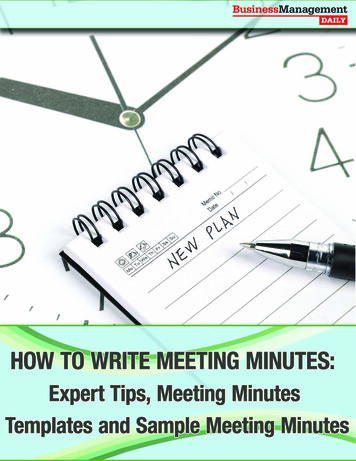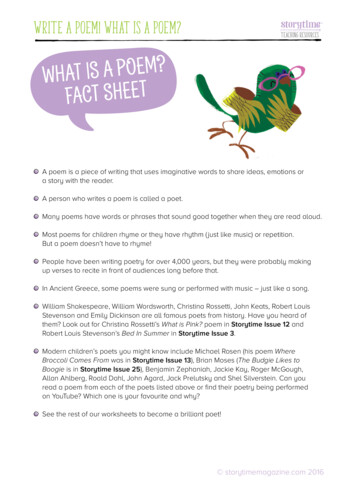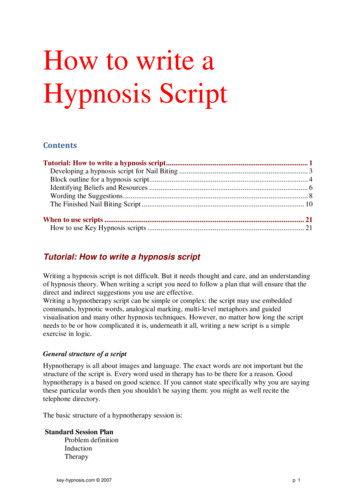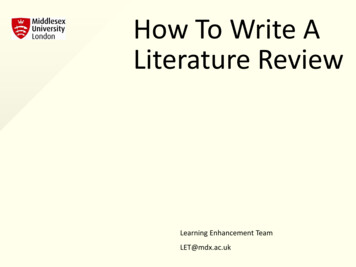
Transcription
How To Write ALiterature ReviewLearning Enhancement TeamLET@mdx.ac.uk
Variety is the Spice of Life!Different Schools .Different Rules– Can you use ‘I’ in an academic text?– Should an essay have section headings?– How long is a report?– Do you use primary or secondary research?– Footnotes, endnotes or no notes?– Harvard style referencing or MLA? What about APA?Which school are you in? What is acceptable and what isunacceptable in your field?Always check in your module handbooks or with yourtutor if you are concerned about appropriacy Middlesex UniversityHow To Write A Literature Review 2
How To Write A Literature Review Aims— To look at the structure and purpose of a Literature Review— To discuss the process(es) of writing a Literature Review— To look at ways to use research and references in a LiteratureReview Middlesex UniversityHow To Write A Literature Review 3
What Is A Literature Review?Depending on your school and programme, your LiteratureReviews may have differences. However, generally a LiteratureReview is:— An effective summary and synthesis of selected documents on a researchtopic. It may also include elements of evaluation— A critical synthesis of previous research which leads logically to the researchquestion(s) that you wish to ask/explore in your project or dissertationWhat does all this actually mean?What is ‘synthesis’?What is the purpose of a Literature Review? Middlesex UniversityHow To Write A Literature Review 4
Purpose Of A Literature Review (1)— Provides an overview of what has been said in the field— Summarises who the key writers in the field are— Summarises key theories, models, hypotheses, researchfindings – and more?— Discusses what questions are being asked in the fieldWhat is a theory? “Any concept, construct or conceptual framework that helps us thinkabout and/or better understand some aspect of an issue of concern”(Cameron & Price, 2009) Middlesex UniversityHow To Write A Literature Review 5
Purpose Of A Literature Review (2)— To establish the context for the topic/problem— To place the writer’s research in its historical context— To synthesise and gain new points of view— To highlight the significance of a particular issues or problems— To distinguish what has been done from what needs to bedone.Being critical is essential whenwriting academically. If you feelunsure, try the Critical Thinking AWLOpen Workshop. Middlesex UniversityHow To Write A Literature Review 6
Entering A ConversationAcademia is in some ways very similar to a group of friends‘arguing’ about sport or politics – just imagine you are coming lateto the conversation. What do you do?A Literature Review is about getting involved in the conversation,but is grounded in academic theory and reasoning. Middlesex UniversityHow To Write A Literature Review 7
Entering The ConversationIntellectual (logos):— Location of your question / problem within its wider academic / professionalcontext— Position of your research within the discipline; its meaning, significance,relevance and purposeSocial (ethos):— Establishing your right to speak— Establishing why someone should read your workRhetorical:— Generalspecific pattern of information— The creation of the threadWhat is the thread? Why is it important? Middlesex UniversityHow To Write A Literature Review 8
Features Of A Literature ReviewWhat do you think makes a good / bad Literature Review?Poor Literature ReviewsGood Literature ReviewsConfusing and wordyClear and conciseIs essentially an annotated bibliographySynthesises available researchUses only a minimum amount of sourcesUses a wide range of relevant, up-to-datesourcesOnly summarises the literatureEvaluates, compares, contrasts andcomments on the literature wherepossible Middlesex UniversityHow To Write A Literature Review 9
Writing A Literature ReviewWhat do you think are the different stages when writing aLiterature Review?Thinking,reflecting,planning1. Thinking of ideas2. Sources3. NarrowingEditing andcheckingReading & notetaking4. Notes5. Assessment6. Planning7. Write, and rewriteWriting andrewritingDrafting andredraftingThe truth is, all these stages happen concurrently – writing is acircular process Middlesex UniversityHow To Write A Literature Review 10
Stage 1 – Thinking Of IdeasBrainstorm and source key literature in your area(s)— Books, papers, articles and so on written by key authors in the field— Policy and guidance documentsSome initial starting points:— Abstracts— Course bibliographies in your module handbooks— List of references in textbooks, articles and so on— Electronic databases (eg. KeyNote)— Google Scholar— Learning Resources Library Guides— SummonDon’t forget the AWL OpenWorkshop How To Read JournalArticles can help you get to the cruxof critical reading!— Subject Librarian Middlesex UniversityHow To Write A Literature Review 11
Stage 2 – Select Your SourcesThese are the stages when you find you are reading a lot – and it may not all makesense yet! Don’t worry, this is perfectly natural.1.Identify journal and magazine articles appropriate to your area of study and check theindexes for suitable articles2.Follow up references and bibliographies in books and articles3.Browse the library catalogues, look at the shelves4.Refer to specialist reader lists from other parts of your course5.6.Use the internet – but be very careful, and don’t let the web become your primarysourceIf you get stuck, or reach a dead-end, you can always ask your tutor / lecturer for help Middlesex UniversityHow To Write A Literature Review 12
Stage 3 – Narrow It DownAfter so much reading, you need to refine! There are four keyelements to consider:1.Identify the focus of the field – this will be the general topic or subject areawithin which the problem of issue you are investigating is set.2.Select the appropriate sources of information – from what you have read,what can you use directly? Indirectly?3.Extract information of direct relevance – a Literature Review isn’t the timeto show off how much you have read. Keep it relevant!4.Concentrate on those texts which provide information you need – you willneed to have clarity in your writing Middlesex UniversityHow To Write A Literature Review 13
Stage 4 – Take NotesNote taking is crucially important. How do you take notes?Good notes involve you and the text communicating – highlightingwords or sentences is not good note taking.Some top tips:1. Summarise2. Paraphrase3. Quote4. Ask questions and make comments – this is your criticality!5. Keep detailed referencing information in your notes – author,date, title, publisher Middlesex UniversityHow To Write A Literature Review 14
Stage 5 – Assess Your ResearchEveryone reaches that stage – the one where you have pages ofnotes and no idea what to do with them!Reflection: Is this enoughnow or is there still moreto include?Reflection: Is thisenoughinformation?Sort and prioritise the literature you have alreadySee which authors/ideas compliment each otherSee which authors/ideas disagree with each other Middlesex UniversityHow To Write A Literature Review 15
Stage 6 – PlanThere are many different approaches to planning. With a partner,discuss:How do you plan? Is it effective? Do you plan?What’s the best way to organise your literature Review:– Chronologically?– Thematically?– By ‘different schools of thought’? Middlesex UniversityHow To Write A Literature Review 16
Stage 7 – Write And RewriteWrite Write Draft Draft Write Write Draft Draft Middlesex UniversityThis stage can feel quitelaborious and repetitive –but remember that highquality work is always theresult of a careful draftingand redrafting process.Did you know that an LDU Tutorialcan be used to check plans and/ordrafts? You don’t need a ‘finished’text to ask for help!How To Write A Literature Review 17
Bring It All Together“We do not store experience as data, like a computer: we story it”(Winter, 1998).What do you think this means?How might this apply to you Literature Review? Middlesex UniversityHow To Write A Literature Review 18
Features Of A Literature ReviewSectionIntroductionBodyConclusion Middlesex UniversityPurpose‒‒‒‒‒Provides overall contextMentions a range of topicsProvides signpostingOrientates the readerIntroduces the need to read‒ A series of different paragraphs, eachdealing with an individual topic‒ Leads us logically to the conclusion‒ Follows a logical structure for thereader‒ Summarises the main points made inthe Literature Review‒ Provides the writer’s own views‒ Leads to the writer’s own researchHow To Write A Literature Review 19
Literature Review IntroductionsLiterature Reviews are like essays, and follow the same structure – including anintroduction. A good introduction will typically:— Introduce the topic generally— Indicate why and in what ways the topic is important— Highlight differences of opinion on the topic (?)— Describe how the Literature Review will be structured Middlesex UniversityHow To Write A Literature Review 20
Literature Review ProcessThinking,reflecting,planningEditing andcheckingWriting andrewriting Middlesex UniversityReading & notetakingDrafting andredraftingHow To Write A Literature Review 21
Weak Writing— Lack of Planning No direction No focus— Failure to dissect the problem/issue/question Just writing about the general topic— Letting the material ‘speak for itself’ Vague, detached, aimless writing– The reader is thinking “and.?”; “so what.?”— Weak introduction The reader can’t see what’s coming and whyResults in the texthaving no genuinemeaning Middlesex UniversityHow To Write A Literature Review 22
TaskCriticality means putting yourself forward. Many writers wonderhow can they come into their own writing, when they are usuallyexploring other people’s ideas.What do you think? Discuss with your partner.— Text organisation and presentation— Argument— Analyses and balance of information— Structuring of ideas and arguments— Linking and signalling— Relationship with reported knowledge— Relationship with the reader(s) (i.e., being cautious / being confident) Middlesex UniversityHow To Write A Literature Review 23
Good WritingGood writing maintains the thread. Do you know the story ofTheseus and the Labyrinth?“Ariadne, King Minos' daughter, fell in love with Theseus and gavehim a ball of thread so he could find his way out of the Labyrinth”. Middlesex UniversityHow To Write A Literature Review 24
Theseus In The LabyrinthTheseus found his way out of the Labyrinth by using a thread. Youcan do the same by:— Create a thread (planning)— Maintain the thread (stay focused) Careful planning Dissection of the research question / issues Guide the reader through your argument(s) / analysis Signposting your direction / your progress Assertive introduction Use topic sentences and transition paragraphs Relate you ideas, arguments and statements back to the researchquestion and/or the issues in order to answer the question Middlesex UniversityHow To Write A Literature Review 25
Create Your ThreadDevelop a crystal clear understanding of:—The material you’re reading—Your research aims / research questions—How your Literature Review leads into your aims /questionsPlan and structure your approachesDevelop analysis and argument(s)Create and maintain your thread Middlesex UniversityHow To Write A Literature Review 26
Or To Put It Another Way “To be accurate, write; to remember, write; to knowthine own mind, write” (Tupper in Douglas (1937).To this we might add:“to know thine own mind and other people’s minds,write”. Middlesex UniversityHow To Write A Literature Review 27
Thinking ‒‒‒‒‒‒‒‒‒‒‒‒‒‒Finding things outWorking things pingPredictingConcludingDistinguishingNoticing exceptions‒‒‒‒Noticing connectionsRealising underpinningsNoticing assumptionsTesting(Adapted from McGuinness, 1999)Don’t forget, you can book aspot on the Critical ThinkingAWL Open Workshop! Middlesex UniversityHow To Write A Literature Review 28
ReferencingWhy do you think referencing is so important in academic writing?Here’s a clue, plagiarism is only one of the possible answers!— To give yourself credibility This establishes your right to participate in the field (ethos)— To make yourself more persuasive Giving evidence in your arguments (logos)— To give credit to the original author This shows professionalism and respect— To give your readers clear and sufficient detail This allows your readers to locate ideas for themselves Middlesex UniversityHow To Write A Literature Review 29
Critical ReferencingWhich reporting verb you chose can show the reader how you feelabout the information you’re referencing. What’s the differencebetween:Claim State Stated Prove Suggest Argue— Truth states— Your interpretation of the original writer’s ‘motivation’— Your purposeTense is also important. Tense can show:— Relevance— Focus— Generality specificityThe AWL Open WorkshopsIntegrating Sources In Your Writingoffer more detail on criticalreferencing.— Truth Middlesex UniversityHow To Write A Literature Review 30
ReferencingThere are two ways you can include a citation in your text:— Removed from the grammar of the sentence: “Codes fix relationships between concepts and signs” (Hall, 1998:32)— As a grammatical part of the sentence: According to Hall (1998:32) “codes fix ” As stated by Hall (1998:32) “codes fix ” Hall (1998:32) states that “code fix ”The LDU AWL Open WorkshopsUnderstanding Plagiarism AndReferencing may also be useful. Middlesex UniversityHow To Write A Literature Review 31
ParaphrasingChange the syntax—i.e., the word orderChange the word class—i.e., a noun verb; verbadjective; verb nounUse synonyms—i.e., happy, delighted, pleased Middlesex UniversityHow To Write A Literature Review 32
TaskHow many different ways can you say the same thing?“I really like you, and you’re a great friend, but ”“I think we’re going to have to let you go ” Middlesex UniversityHow To Write A Literature Review 33
Language to SummariseThere are many different ways to summarise yoursources, for example:Essence— The essence of the argument is that . (Emslie & Hunt, 2009).— In essence, Emslie & Hunt’s (2009) argument is that — Essentially, what Emslie & Hunt (2009) argue is that — At its heart, Emslie and Hunt (2009) are arguing that.Other common verbs are:ArgueClaim Middlesex UniversitySuggestShowDemonstrateHow To Write A Literature Review 34
ImplicationsWhat this shows us the essential importance of:— Knowing your purpose / aims— Knowing why you’re using the material— Knowing the material itself— Understanding how the materials fits into the bigger picture – yours and thecommunity’sThis will create genuine meaning (and paraphrasing/ summarising) in your work Middlesex UniversityHow To Write A Literature Review 35
Avoiding PlagiarismWhat advice do you have to help you avoid accidentallyplagiarising?— Write notes in your own words— Be fanatical about keeping notes of where you get yourinformation from when making notes— In your won writing, use a clear and consistent system ofreferencing— Always provide a full list of reference in your bibliography— When in doubt – give a reference! Middlesex UniversityHow To Write A Literature Review 36
Where now?— Need more detailed assistance? Book a tutorial!— Want feedback on a specific section? Drop in to Getting Your AssignmentReady!— Want somewhere quiet to write, and get on the spot assistance? Try TheWriting Space!— Got a few quick questions? AWL Office Hours at [The Study Hub] are foryou!— AWL Open Workshops can be booked here! Suggestions:– Critical Thinking– How To Read Journal Articles Middlesex UniversityHow To Write A Literature Review 37
How To Write A Literature Review Middlesex UniversityHow To Write A Literature Review 38
Middlesex University Variety is the Spice of Life! Different Scho
